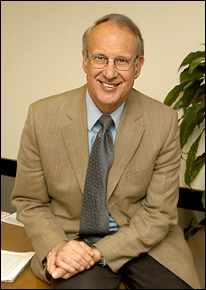Brookhaven Lab's Fritz Henn Awarded the New York Academy of Medicine's Thomas William Salmon Award
December 15, 2008
UPTON, NY — Fritz Henn, Associate Laboratory Director for Life Sciences at the U.S. Department of Energy’s Brookhaven National Laboratory, has been named a recipient of the Thomas William Salmon Award by the New York Academy of Medicine. He received the Salmon Medal at the Seventy-Fifth Annual Salmon Lecture and Medal Award ceremony at the academy’s headquarters in New York City on December 4.
Each year, the New York Academy of Medicine recognizes a prominent specialist in psychiatry, neurology or mental hygiene by presenting the Thomas William Salmon Award for outstanding contributions to those fields. The Salmon Medal was first awarded in 1942 in memory of Thomas W. Salmon (1876-1927), a gifted physician whose contribution to the cause of the mentally ill was one of the most notable in his generation. Henn was honored for his outstanding work in psychiatry and mental hygiene.
“This award means a great deal to me,” said Henn. “Many of my heroes in psychiatry have received it, and I am proud to be in their company.”
Henn is an expert in the neuroscience of depression, an area of research that he has pursued for his entire career. Recently, he discovered a new neural circuit that, if stimulated electrically, can ease depression. This new circuit, a group of interconnected neurons, or nerve cells, that influence each other, has been identified in both animals and humans through two medical imaging methods used at Brookhaven Lab — magnetic resonance imaging (MRI) and positron emission tomography (PET). This research may lead to new, more effective treatments for depression.
Henn also recently found evidence that invalidates a current theory on depression. The theory states that a decrease in the generation of new nerve cells contributes to depression. New advances in brain imaging have allowed scientists to more accurately measure the creation of new nerve cells, which, contrary to earlier theories, are generated throughout life in humans. Henn’s new studies show that these nerve cells continue to be created at a normal rate in depressed individuals as well. Henn has continued his studies of depression at Brookhaven Lab.
A board-certified psychiatrist, Henn earned a Ph.D. in physiological chemistry from The Johns Hopkins University in 1967, and an M.D. from the University of Virginia in 1971. He performed his residency in the Department of Psychiatry at Washington University School of Medicine from 1971 to 1974. Henn began his career at the University of Iowa College of Medicine, and, in 1982, he joined Stony Brook University (SBU), where he became Professor and Chair of the Department of Psychiatry and Behavioral Medicine. In addition, from 1982 to 1983, he was Director of the Long Island Research Institute, New York State Office of Mental Health, and, from 1983 to 1994, he was Director of SBU’s Institute for Mental Health Research.
Henn moved to Germany in 1994, to become the Director of the Central Institute of Mental Health and Professor of Psychiatry at the University of Heidelberg. In October 2008, he was awarded the Federal Cross of Merit, a high-level honor of the Republic of Germany for his leadership and distinguished scientific contributions at the Central Institute. Henn joined Brookhaven Lab to assume his current position in 2006.
2008-10878 | INT/EXT | Newsroom










